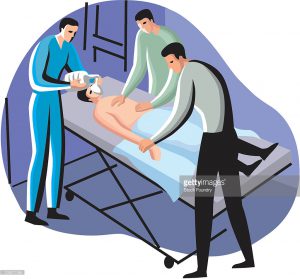SomnusNooze
We’ve summarized a journal article that addresses some anesthesia considerations for patients with idiopathic hypersomnia. If you need to have surgery of any kind, you may want to share this information with your healthcare providers.

Summary of:
Aflaki S, Hu S, Kamel RA, Chung F, Singh M. Case Report of a Patient With Idiopathic Hypersomnia and a Family History of Malignant Hyperthermia Undergoing General Anesthesia: An Overview of the Anesthetic Considerations. A&A Case Rep. 2017 May 1;8(9):238-241. doi: 10.1213/XAA.0000000000000481. doi: 10.1213/XAA.0000000000000481.
PubMed link to article: https://www.ncbi.nlm.nih.gov/pubmed/28328583
Background
Idiopathic hypersomnia (IH) causes excessive daytime sleepiness, despite a full night of sleep or more. Unfortunately, it is unknown what causes this debilitating sleep disorder. It is also unknown how people with IH tolerate and process medications involved in anesthesia, which was the focus of this study.
What kind of research was this study? Who were the participants and what did they do?
This was a case study, which means there was only one study participant. This person was a 55-year-old woman who had a history of IH. She received both local (used to block pain in one area of the body1) and general anesthesia (used to put someone in an unconscious state, affecting the entire body1) for a surgery on her shoulder. The patient was taking several medications and had other health concerns, one of which was a family history of malignant hyperthermia. Malignant hyperthermia is a disease that causes severe, life-threatening reactions (high fever and rapid heart rate, for example) to drugs which are often used during anesthesia2. The patient was also taking modafinil, which helped to control her IH symptoms.
What were the results of the study?
The authors discuss special needs which must be considered when patients with IH undergo procedures that require anesthesia.
Preoperative (prior to the operation): The authors recommend that doctors check to make sure patients have their symptoms under control, and if not, discuss medication options. If necessary, refer them to a sleep specialist for a follow-up.
Intraoperative (during the operation): During the operation/procedure, the authors suggest that surgeons and anesthesiologists be careful to make sure that the patient is fully asleep and unaware. Also, anesthesiologists should think about how medications used to treat IH may interact with anesthesia. Some of these drugs can affect enzymes in the liver, which then might alter the metabolism of certain drugs (i.e., how drugs are broken down in the body). Medications used to treat IH also might affect how much anesthesia is needed, and how aware a patient is during a procedure, although more studies need to be done to determine exactly how these drugs interact. Doctors also must be careful to make sure that patients recover well from anesthesia, because grogginess upon awakening may actually be a symptom of IH and not a lingering effect of anesthesia.
Postoperative (after the operation): When the surgery is over, the authors advise doctors to make sure IH patients are not sleepier or more sedated than they were before the procedure. They also suggest to be wary of prescribing postoperative pain medications, which may cause more sleepiness, and to monitor patients closely after they have been discharged from the hospital.
For the patient in this study, there was no awareness during the procedure, while on both general and local anesthesia, even though the patient was still taking modafinil. Additionally, the patient’s symptoms were not worse after the procedure and there were no long lasting effects of anesthesia on the patient’s IH 4 weeks after the surgery.
What are the authors’ conclusions?
There are many things doctors must be very careful about when any patient receives anesthetic medications, but there are additional issues that must be considered with IH patients. Since this study only involved one patient, it is important that more studies be conducted to determine exactly how people with IH tolerate and process medications involved in anesthesia.
References:
We are grateful to Jodi Godfrey, Neuroscience Postdoctoral Fellow, Emory University, for summarizing this journal article.
Approved by Lynn Marie Trotti, MD, MSc, Chairperson, HF Medical Advisory Board.
